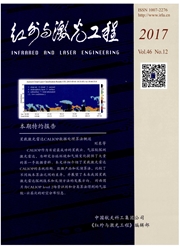

 中文摘要:
中文摘要:
研究了QPSK副载波调制下乘性噪声与加性噪声对接收端星座图影响。基于Gamma—Gamma信道模型,分析了乘性噪声和加性噪声影响下系统的接收星座图。通过仿真实验计算了混合噪声情况下的星座图分布以及接收端功率谱密度。讨论了混合噪声条件下,不同能见度、传输距离对系统误码率的影响。结果表明:随着湍流强度的增强,接收端功率谱存在明显的展宽迹象;不同加性噪声条件下,当能见度小于传输距离时,气溶胶粒子散射为影响通信的主要因素。不同乘性噪声条件下,当能见度处于0.5~1.5km时,乘性噪声会影响接收光强,进一步增大系统误码率。文中工作对真实环境下降低无线激光通信的误码率和提高通信质量有重要意义。
 英文摘要:
英文摘要:
The received constellation effect of QPSK subcarrier modulation by multiplicative noise and additive noise was studied. A theoretical model of laser communication system was constructed, the received constellation of the system under multiple noise and additive noise was derived. The constellation distribution and the power spectral density of the receiver were calculated under mixed noise environment. The influence of system bit error rate in different visibilities and transmission was analyzed in detail under mixed noise environment. The results show that with the change of turbulence intensity, the receiver power spectrum has obvious broadening. When the visibility is less than the transmission distance, the atmospheric aerosol scattering is the main factor affecting the communication under different additive noise conditions; when visibility is 0.5 km to 1.5 km, the passenger noise will affect the reception light and increase the system error rate under different multiplicative noise conditions. The proposed works are very important for reducing the bit error rate of laser communication and improving the communication quality in the real environment.
 同期刊论文项目
同期刊论文项目
 同项目期刊论文
同项目期刊论文
 期刊信息
期刊信息
